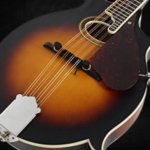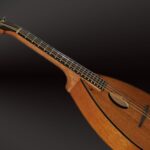Today I’m here to talk about the best professional banjos out there right now. Maybe you’re a pro player looking for suggestions, or maybe you’re a beginner or intermediate player who wants to upgrade. Either way, I hope to give you the tools to find your next banjo.
Below you’ll find info about banjo brands, construction, and accessories, as well as a list of 10 of my favorite professional banjos. Many of these I’ve played myself, and I’ve seen and heard them played by other professional banjoists.
Quick Look: Best Professional Banjo
★ #1 Best Professional Banjo Overall: Deering Sierra ★
- Best Resonator Professional Banjo: Deering Sierra
- Best Open Back Professional Banjo: Gold Tone BC-350 Bob Carlin
- Best Electric Professional Banjo: Gold Tone EBM-5
- Best Long Neck Professional Banjo: Vega Long Neck Banjo
- Best Professional Banjo Under $2,000: Recording King RK-75 Elite
- Best Professional Banjo Under $1,500: Gold Tone BC-350 Bob Carlin
My name’s Ryan Burns, and I’m a banjo player and songwriter from Chicago, Illinois. I’ve been playing and teaching banjo for 10 years. I received a bachelor’s in music from the University of Illinois, attended Bela Fleck’s Blue Ridge Banjo Camp, and studied under Greg Cahill.
Banjos
What Is a Professional Banjo?
The banjo is a plucked string instrument made of a frame covered in a taut skin or plastic head. It has a long neck and strings stretched across it. It has a unique, twangy sound and is made of many small interchangeable parts, which makes it different from most other string instruments.
To know about that banjo, you need to also know about its history. The instrument has roots in Africa and was brought to America by the slave trade. Over years of development in slave communities, it became intertwined with American folk music.
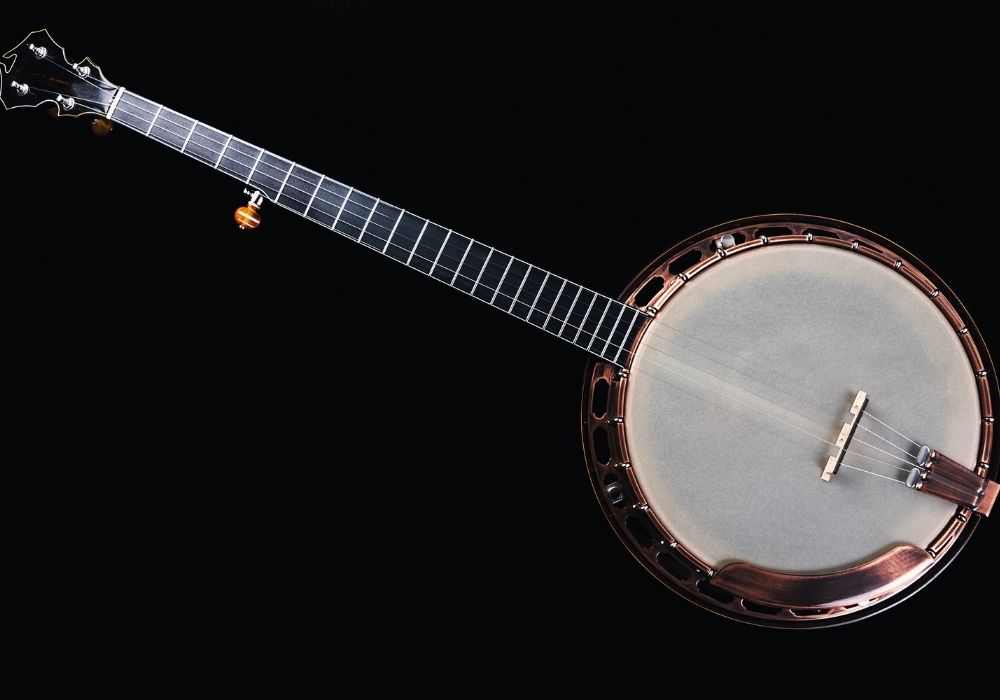
Professional banjos are painstakingly built from the best materials available to produce loud, clear tones. Along with this, they’re usually handmade by master craftsmen out of solid heavy materials, which is why they’re usually much heavier than other banjos.
What’s the Difference Between Beginner, Intermediate & Professional Banjos?
The main differences between beginner, intermediate, and the best professional banjos are about who builds them and the materials used, as well as the amount of effort and time spent on the look of the instrument.
- Beginner Banjos: When you’re first learning an instrument, generally the biggest barrier to begin playing is cost. Starter banjos are generally made cheaply to be accessible. They use lighter, lower quality materials assembled in large factories.
- Intermediate Banjos: Instruments for intermediate players incorporate better types of wood and metal. They closely resemble professional banjos in sound, but are often not quite as painstakingly assembled.
- Professional Banjos: Professionals choose their banjos mainly based on sound and playability, but their banjos look great, too. Top-quality banjos are generally built by hand using hand-picked woods and hand-machined metal parts. They’re put together to very precise standards.
Types of Professional Banjos
There is a lot of variety in the world of banjos. Although most are 5 string resonator or open back banjos, there are many other kinds like 6-string banjos, electric banjos, gourd banjos, ukulele banjos, mandolin banjos, and more.
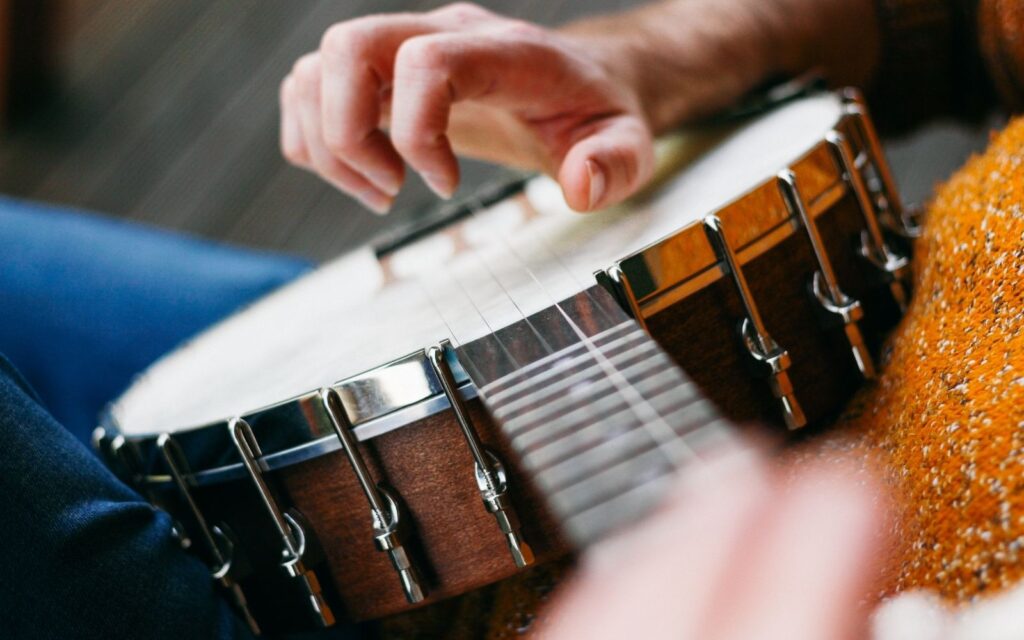
Resonator (Bluegrass) Banjos
If you picture what a banjo looks and sounds like, there’s a good chance that you’re thinking of a resonator banjo used in bluegrass music. These are 5-string banjos played with fingerpicks that have a closed-back (resonator) and a punchier, twangier sound.
See more: Best Bluegrass Banjo Buyer’s Guide
Open Back (Clawhammer) Banjos
The other most popular style of the banjo is the open-back banjo. These are also 5-string banjos, but without a resonator. They’re used for old-time clawhammer playing and have a plunky, less bright sound than what’s generally heard from a resonator.
See more: Best Clawhammer Banjo Buyer’s Guide
Tenor/Plectrum Banjos
These can either be open or closed back, and only have four strings instead of five. Tenor and plectrum banjos are different sizes, and are both used primarily in Irish music and jazz with a pick or plectrum.
6 String Banjos
Tuned and built similar to guitars, 6 string banjos are constructed with the body of a banjo and the neck of a guitar. This way, a guitar player can get a similar tone to a banjo without having to learn new tunings.
See more: Best 6 String Banjo Buyer’s Guide
Ukulele Banjos
Ukulele banjos were created in the early 20th century to be tuned and played like a ukulele, but with the unique sound you can only get from construction featuring a taut banjo head.
Electric Banjos
There are many ways you can make a banjo electric. You can just insert pickups or microphones inside a standard banjo, or there are entirely new constructions tuned like a banjo, but with a body more like an electric guitar.
Other Banjos
Along with these types, there are several other banjos, from mandolin and bass banjos to gourd banjos and harp banjos. Most of these are relatively uncommon and some need to be custom made.
Things to Consider When Choosing a Professional Banjo
When you’re purchasing a professional banjo, you’re making a significant investment. It’s important to carefully consider your options.
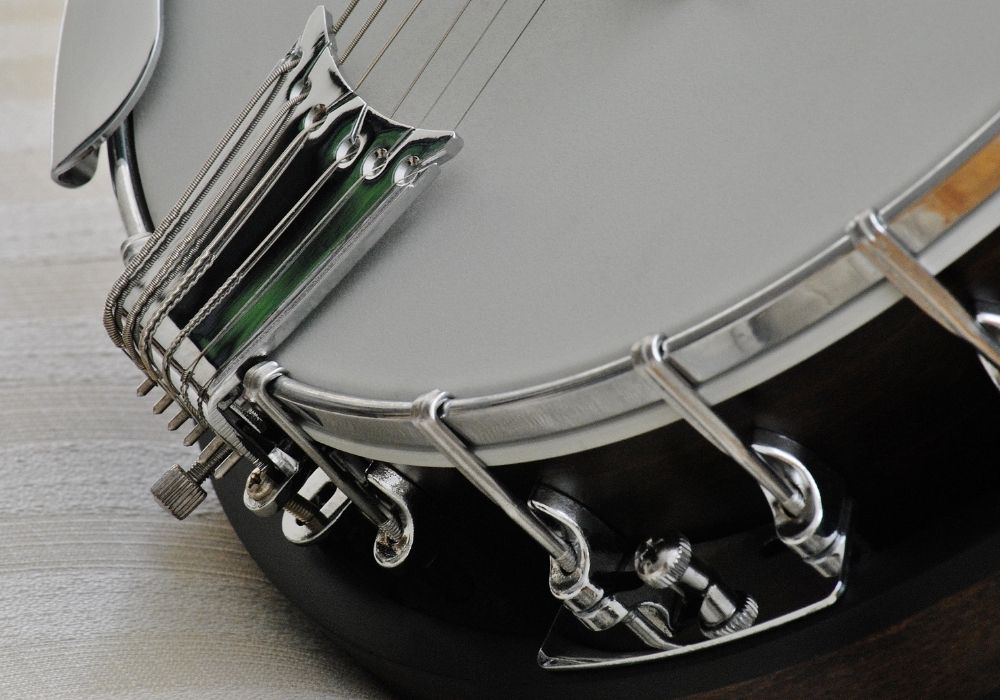
Pay attention to the materials, parts included, size, tone, builder, and of course price.
Materials
Most professional banjos are made from solid hardwoods like maple or mahogany, which can vastly change the tone, and solid cast brass tone rings. Along with that, the hardware is often brass or steel, and they feature mother of pearl or similarly attractive inlays in the neck and headstock.
Parts
While almost any banjo will have the basic banjo parts (rim, neck, head, bridge, tailpiece), the best professional banjos will also feature a tone ring, railroad spikes (to tune up the 5th string) and higher quality tailpieces, bridges, and flanges.
Size/Weight
Because of the solid materials used and the sturdier construction, high-quality banjos are quite heavy, usually between 10-15 lbs. But, depending on the type of banjo, the size and weight may vary. For example, a ukulele banjo is much smaller than a bass banjo.
Overall Tone & Sound
Banjos in general have some element of twang to them, and any professional banjo should also have clear direct tones. But, many types of banjos have different sounds. For instance, a bluegrass banjo should be punchy and powerful, whereas an old-time banjo might be plunky and natural sounding.
Builder
The company or individual who builds your banjo usually indicates more about its reliability, playability, and tone than almost anything else. A reliable builder with a solid track record will put out great sounding banjos every time.
Price
The best professional banjos aren’t cheap, and at the low end generally cost upwards of $1000 and sometimes up to $5000 or more. If you’re willing to look locally and be patient, it’s possible to find used budget options if you know what you’re looking for.
10 Best Professional Banjos
Here are a few of my favorite widely available professional banjos. I focus mostly on 5-string resonator and open-back models as they’re the most popular, but there are great banjos out there in any style.
 Deering Sierra
Deering Sierra
- Parts & materials: Deering ’06 bell bronze tone ring, mahogany neck & resonator, 3-ply maple rim
- Weight: 12.3 lbs
- Style: 5-string resonator
- What’s included: Banjo, hardshell case
- Best for: Professional bluegrass players
The Deering Sierra is one of my favorite banjos to play. It’s a workhorse instrument used by lots and lots of professionals. It has a balanced, punchy sound and feels great, while also having a classic and polished bluegrass banjo look. It comes in tenor, 6-string, and plectrum styles.
✅ Fantastic sound
✅ Solid setup and build
✅ Good price for what you get
✅ Top-notch parts and materials
❌ A bit more expensive than others
❌ None
Why I Recommend It
While the Sierra is a bit more expensive than some others on this list, for what you’re getting this is a fantastic value. You’ll be getting a true professional quality banjo.
Gold Tone BC-350 Bob Carlin Signature
- Parts & materials: Scooped maple neck and rim, rolled brass tone ring, Planetary tuners
- Weight: 6.5lbs
- Style: 5-string open back
- What’s included: Banjo
- Best for: Professional clawhammer players
This is a solid banjo that feels great in your hands. It has a sweet but powerful sound for an open back banjo. The Gold Tone BC-350 design was approved by Bob Carlin himself. It has an interesting and innovative combo of a dowel rod for an old-time tone and a coordinator rod for adjustability.
✅ Sweet and clear sound
✅ Very solid feel
✅ Good setup
✅ Great value
❌ No case
❌ None
Why I Recommend It
One of my students bought one of these recently. It’s a great banjo to play, and I can’t say enough about how solid and polished it feels when you’re playing it.
Recording King RK-75 Elite
- Parts & materials: Mastertone style tone ring, 3-ply maple rim, mahogany neck and resonator
- Weight: 11.5 lbs
- Style: 5-string resonator
- What’s included: Banjo, hardshell case
- Best for: Bluegrass players looking for the classic Mastertone looks and sound
Many modern bluegrass banjos are trying to replicate the prewar Mastertone banjos, and the RK-75 Elite is one of the best you can find out there. At a very affordable price for its features, this banjo gives you a fantastic cutting sound and lives up to many of those sought-after vintage instruments.
✅ Classic Mastertone sounds
✅ Vintage style
✅ Affordable price point
✅ Good setup
❌ Similar to the RK-35 and 36
❌ Doesn’t bring much new to the table
Why I Recommend It
If you’re looking to emulate the look and sound of the great prewar instruments out there, the RK-75 is your go-to for an affordable vintage sound.
Vega Long Neck Banjo
- Parts & materials: Violin grade 3-ply maple rim, long maple neck, Tubaphone style brass tone ring
- Weight: 8 lbs
- Style: 5-string long neck open back
- What’s included: Banjo, hardshell case
- Best for: Clawhammer players looking for a deep tone, Pete Seeger enthusiasts
Vega banjos, now manufactured by Deering, are a classic brand that was used by many long neck banjo players of the past. The Vega Long Neck Banjo is a great example of a well-built, detail-oriented, and fantastic sounding long neck banjo great for many different genres.
✅ Deep and resonant sound
✅ Solidly built
✅ Classic simple look
✅ Versatile tuning options
❌ Pretty expensive
❌ Style not for everyone
Why I Recommend It
If you’re looking for a deeper sound or want more options for keys to play in, this long neck banjo is a top-of-the-line option for any clawhammer player.
 Gold Tone OB-250
Gold Tone OB-250
- Parts & materials: Maple neck, rim, and resonator, brass tone ring, one piece zinc alloy flange
- Weight: 10 lbs
- Style: 5-string resonator
- What’s included: Banjo
- Best for: Bluegrass on a budget
Frank Wakefield himself approved the Gold Tone OB-250, the budget-friendly bluegrass banjo from Gold Tone. With a bright clear tone, this banjo really stands up to more expensive options, and there are upgraded models like the OB-250+TP with a special Tony Pass rim.
✅ Clear bright tone
✅ Very affordable
✅ Good setup and build
✅ Upgrade options
❌ No case
❌ Not very round tones up the neck
Why I Recommend It
A very solid bluegrass banjo option for the price, the OB-250 is a go-to if you’re looking for a professional bluegrass banjo on a budget.
 Deering Calico
Deering Calico
- Parts & materials: Curly maple neck and resonator, Ivoroid purling and binding, Deering ’06 tone ring, violin grade 3-ply maple rim
- Weight: 11 lbs
- Style: 5-string resonator
- What’s included: Banjo, hardshell case
- Best for: Premium professional players
The Deering Calico is an upgrade in many ways from their Sierra model, with many aesthetic upgrades like an intricate purling and binding and superb looking curly maple. A little brighter tone and a sweeter sound comes from the all-maple build, and greater projection comes from the tapered resonator.
✅ Sweet and clear sound all over the neck
✅ Great setup and finishing touches
✅ Beautiful looks
✅ Solidly built
❌ Expensive
❌ Too bright for some
Why I Recommend It
If you’ve got the cash and want a bright, classic bluegrass sound, the Calico is an amazing banjo from the consistently great Deering.
 Gold Star GF-200
Gold Star GF-200
- Parts & materials: Prewar style maple neck, resonator and rim, sand cast tone ring, Gotoh tuners
- Weight: 12 lbs
- Style: 5-string resonator
- What’s included: Banjo
- Best for: Bluegrass players
Another great example of vintage style bluegrass banjos, the Gold Star GF-200 is one from a line of well-built foreign-made bluegrass banjos from Gold Star. This solidly built banjo combines many vintage elements into a real firecracker of a banjo for a classic bluegrass sound.
✅ Solid vintage sound
✅ Excellent look
✅ Good, reliable setup
✅ Superior case included
❌ Expensive for a Chinese made instrument
Why I Recommend It
It’s another great option if you’re looking for that classic banjo look and sound with many professional touches.
 Deering Maple Blossom
Deering Maple Blossom
- Parts & materials: Deering ’06 tone ring, maple neck, resonator, and rim, pearl heart and blossom inlays
- Weight: 12.5 lbs
- Style: 5-string resonator
- What’s included: Banjo, hardshell case
- Best for: Bluegrass players
Any model of Deering Banjos is guaranteed to be a well-made and great sounding instrument, and the Maple Blossom is no exception. Another all-maple model like the Calico, the Deering Maple Blossom has a few different tonal and aesthetic touches, which differentiate it from other Deering models.
✅ Clear bright tone
✅ Great walnut stained look
✅ Excellent setup and feel
✅ Case included
❌ Expensive
❌ Very similar to the Calico
Why I Recommend It
It’s another great option from Deering, which I recommend if you have the budget for it and are looking for a cutting yet full sounding banjo.
Gold Tone EBM-5
- Parts & materials: Single coil & humbucker pickups, pretuned 8″ head, F-style mandolin shaped maple neck and body
- Weight: 8.5 lbs
- Style: Electric banjo
- What’s included: Banjo, hardshell case
- Best for: Banjo players in electric bands
If you’re in a loud electric band but still want that banjo sound, then the Gold Tone EBM-5 is a widely used and great option for you. With all the playability features of other Gold Tone banjos plus dual pickups and an attractive mandolin style body, this banjo is sure to please.
✅ Great amplified sound
✅ Playable neck
✅ Cool, unique look
✅ Well built
❌ Not for everyone
❌ Not much volume acoustically
Why I Recommend It
If you’re playing with an electric band, especially with drums, the EBM-5 is a great way to upgrade your sound into the world of electric banjo.
Washburn B17-K
- Parts & materials: Maple neck, rim, and resonator, bell brass tone ring, gold colored hardware
- Weight: 15 lbs
- Style: 5-string resonator
- What’s included: Banjo, hardshell case
- Best for: Bluegrass players
The Washburn B17-K is a great option from Washburn because of its solid bluegrass sound, polished look, and affordable price point. Unlike other banjos on this list, it has gold-colored hardware, which is a plus for some.
✅ Solid sound
✅ Quality parts
✅ Gold hardware stands out
✅ Case included
❌ Not the clearest tone
❌ Inconsistent setup
Why I Recommend It
If you’re looking for an affordable bluegrass banjo made for professionals and you’re into gold hardware, this is the banjo for you.
Best Professional Banjo Brands
There are so many options for where to get quality professional banjos, and there are a few brands that are more widely available and create consistently great instruments.
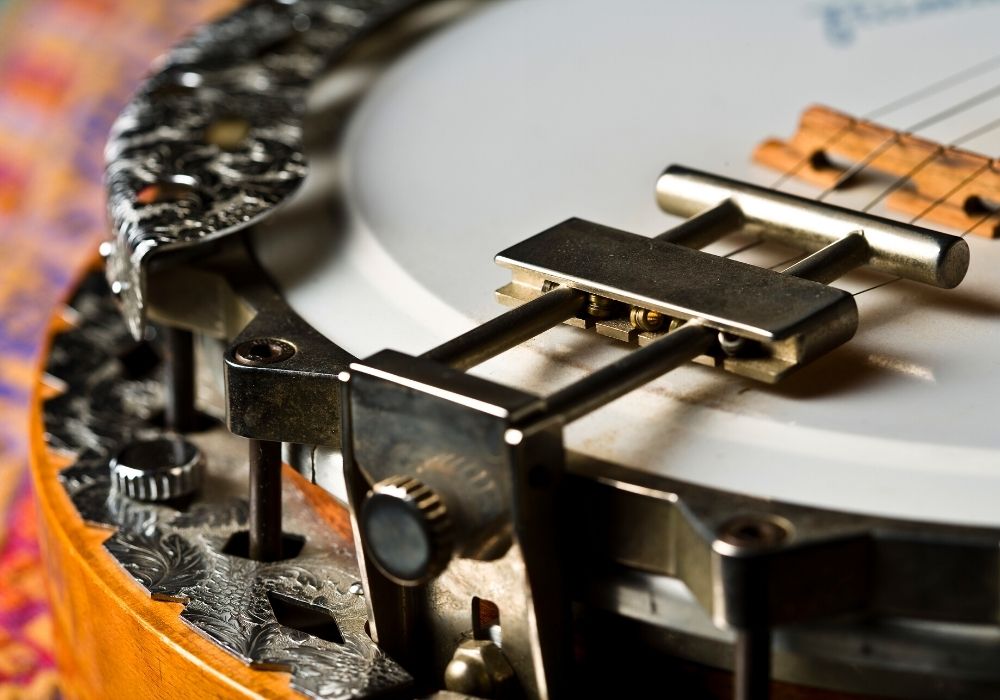
Gibson
Unfortunately, Gibson stopped creating new banjos a few years ago, but they’re still the gold standard for what a professional bluegrass banjo looks and sounds like. If you’ve got the money and time, then finding a vintage Gibson is a great option.
Deering
Deering, founded in 1975 by Greg Deering in California, builds some of the best professional banjos. Its line of Goodtime banjos is great for beginners. They have grown into a big organization, but still have an incredible eye for detail and innovation.
Gold Tone
Gold Tone Music Group was founded in Florida in 1993 and is now a great company to look for entry-level banjos. Though not the place to look for a high-quality professional banjo, Gold Tone sells solid, reliable entry and intermediate-level instruments.
Recording King
Originally the house brand for Montgomery Ward’s lineup of string instruments in the late 19th century, Recording King has been making instruments for a long time. Their lineup ranges from quality low-cost options to some extremely good professional banjos.
Washburn
Since 1883, Washburn has been making string instruments for as long as almost any other company. Now they mostly trade in beginner to intermediate instruments that are affordable and high quality.
Artisan Builders
There are many smaller banjo builders who make professional-quality banjos for a bit less than big name brands. They can be great if you’re looking for great banjos on a smaller budget. Some of my favorites are Sullivan, Ome, Nechville, Pisgah, Seeders, and Yates.
Professional Banjo Aesthetics and Material
Banjos have diverse looks and feels to them, especially when you get to the professional level. There is a lot of variety in what might go into the instrument, too, but there are also some things that you always want to look for.
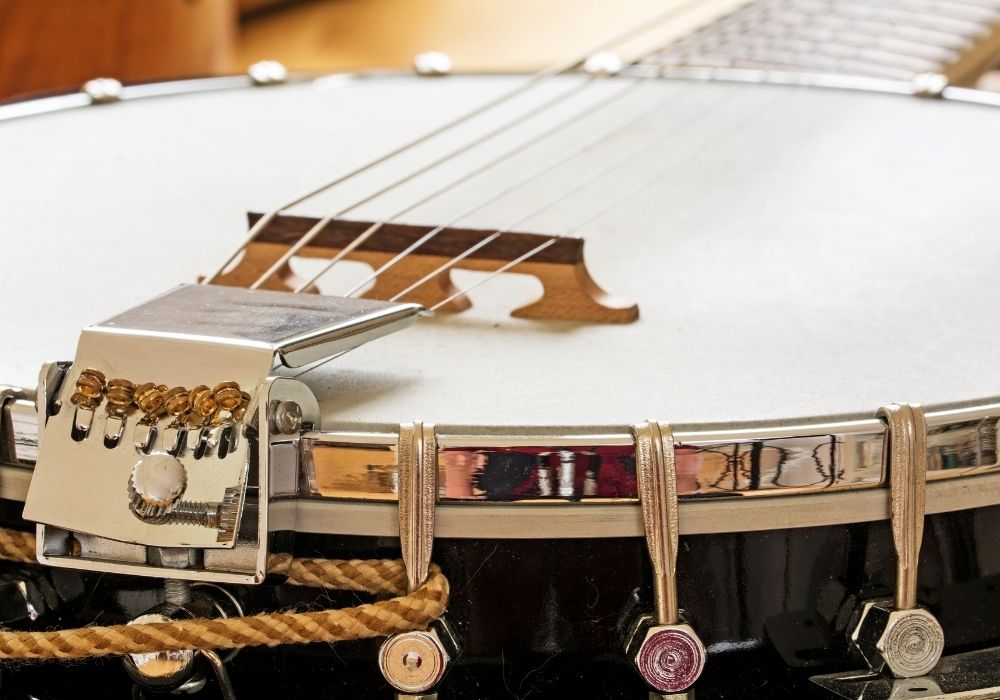
Wood
When looking for your banjo, you should always look for thick, solid woods like maple or mahogany. Sometimes you might see walnut, cherry, or ebony, but maple and mahogany are the most common.
Finish
Banjos finishes range from natural matte to glossy, and neither is particularly better than the other. What can often make a larger difference in price are the high-end inlays, figuring, and lettering, which really make a banjo pop visually.
Color
The wood on most banjos is stained to a natural brown or tan finish, sometimes with shades of yellow or red. The metal on banjos is similarly almost always either coated in a chrome or a gold finish.
Buying New vs Used
When buying big ticket banjos, it’s very desirable to buy new instruments straight from the manufacturer, as you’ll get a warrantee and guarantees on the quality of the build and quality shipping. Used banjos can be a great deal if you know what you’re looking for, but you need to really be sure that the seller is trustworthy, and you should insure the shipping if it’s being shipped.
What’s in a Professional Banjo Box?
Many of the best banjos only come with the banjo itself and maybe a case to go with it. But some banjos come with other accessories like straps, strings, capos, tuners, or instructional books.
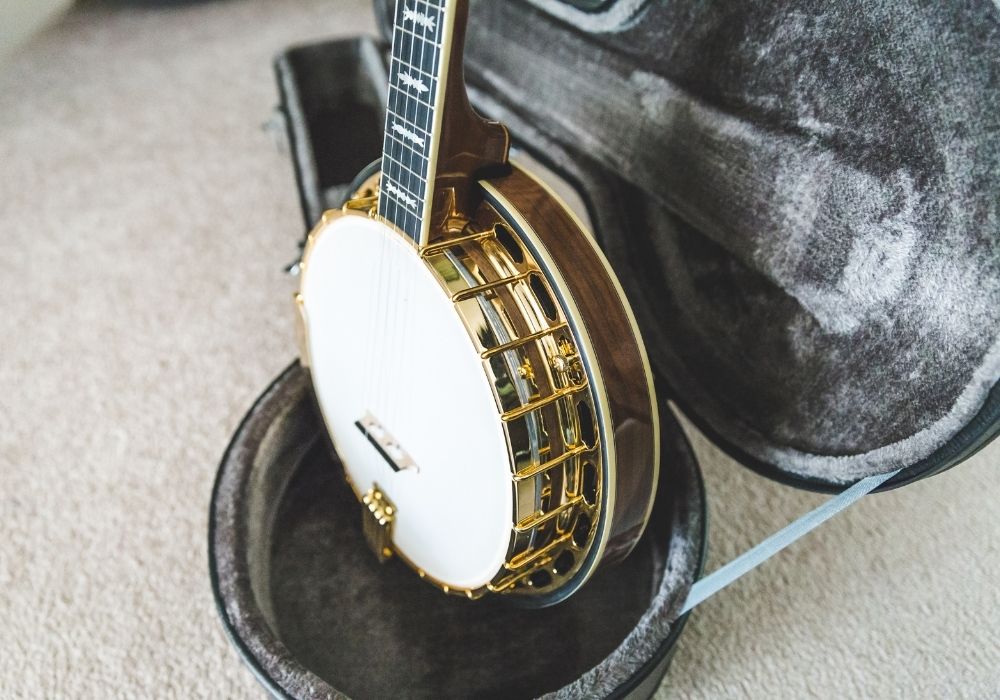
Case
When carrying your banjo around, especially if it’s something you invested a lot of money in, it’s best to have a case. Many banjos come with one included. If not, you should buy a good fitting hardshell case to protect your banjo.
Strap
There are a few different styles of banjo straps (mainly clip-on or cradle styles), but whichever one you go with, it’s an essential accessory, especially if you plan to play standing up at any point.
Capo
A capo is important for playing in different keys. It allows you to change keys quickly without having to alter your playing very much. Some banjos come with one. With banjos you’ll need a normal capo, but also a way to adjust the 5th string (either a 5th string capo or, more commonly, railroad spikes).
Tuner
Tuning is a super important part of playing any instrument, and the banjo is no different. (Insert the numerous banjo tuning jokes here.) Getting a clip-on tuner is extremely convenient, but you can also use your phone if necessary.
Extras
There are a ton of other things that could be useful for playing banjo. Some of them are a stand, a cleaning cloth, tools to make adjustments, spare strings or heads, different bridges, or instructional books.
Professional Banjo Brands to Avoid
While they’re fine instruments generally, you should opt for dedicated banjo brands like Deering over companies that specialize in guitars or other instruments like Fender, Ibanez, or Washburn.
Frequently Asked Questions:
Here are some answers to commonly asked questions.
How Much Do Professional Banjos Cost?
Professional banjos have a very wide range in cost. Look to spend anywhere from around $1000 to $1500 on the low end to well over $5000 and up on the high end. Some vintage Gibsons cost $100,000.
Where Are the Best Professional Banjos Made?
Most of the best banjos are made in the continental US, but some are made in Canada, Japan, or even in the Czech Republic.
What Is the Best Sounding Professional Banjo?
The best sounding professional banjo is the Deering Sierra. It has all the pop, growl, and volume you’re looking for in a high-quality instrument.
Where to Buy Professional Banjos
Online retailers like Amazon or Guitar Center can be great places to find variety, low prices, and great return policies, although they’re sometimes hard to sort through. On the other hand, buying in-store might be less convenient and a bit pricier, but you can ask questions, try out a few instruments, and meet other local musicians.
Amazon
It’s hard to beat the prices and selection for anything on Amazon, and that includes if you’re looking for instruments. Amazon offers a wide range of banjos under $500, easy no hassle returns, quick shipping, and often the best prices.
Online Music Retailers
In addition to Amazon, other online retailers like Musician’s Friend, Guitar Center, or Sweetwater all offer convenience, low prices, and a wide selection. On top of that, with dedicated music retailers you often get more detailed information and a site with nothing but music gear, so there’s less noise to sift through.
Your Local Music Store
If you’re looking for some person-to-person communication, you can’t beat your local music store. Most stores have a selection of instruments to try, friendly staff to answer questions, and even lessons or community events you can attend.
Review This Post
Table of Contents
- Banjos
- What Is a Professional Banjo?
- Types of Professional Banjos
- Things to Consider When Choosing a Professional Banjo
- 10 Best Professional Banjos
- Professional Banjo Aesthetics and Material
- Buying New vs Used
- What’s in a Professional Banjo Box?
- Professional Banjo Brands to Avoid
- Frequently Asked Questions:
- In Conclusion
In Conclusion
I hope you found this article helpful in your quest to find the best professional banjos. There’s a banjo out there for everyone. Keep on looking around and follow the tips in this guide and you’re sure to find your next instrument.
Thanks again for joining me and reading this article. Be sure to check out all the other great string instrument content on the site, especially more about the banjo!
If you have any questions, comments, or your own banjo reviews, feel free to leave comments below and share the article with a banjo-curious friend. See you next time!








